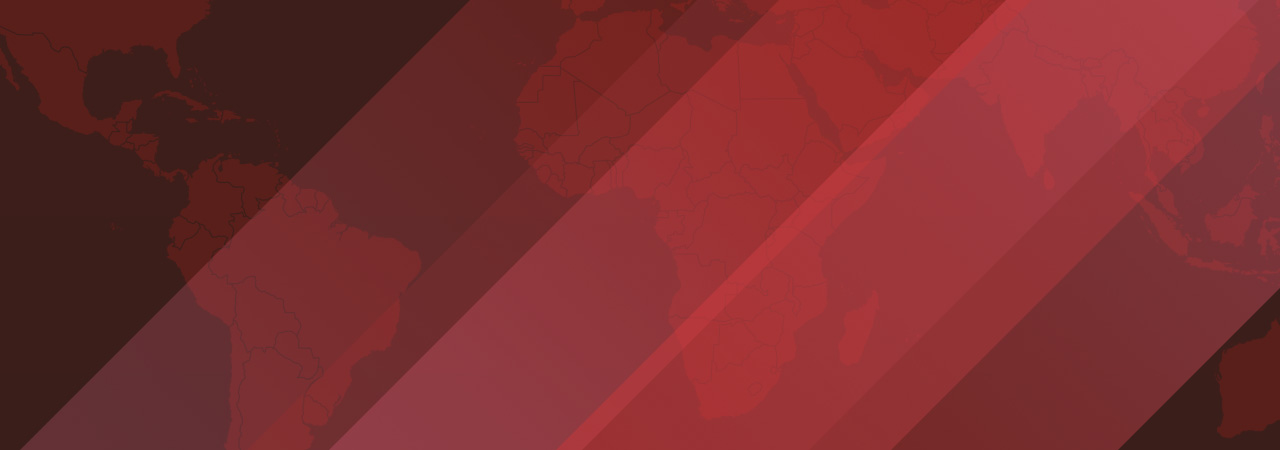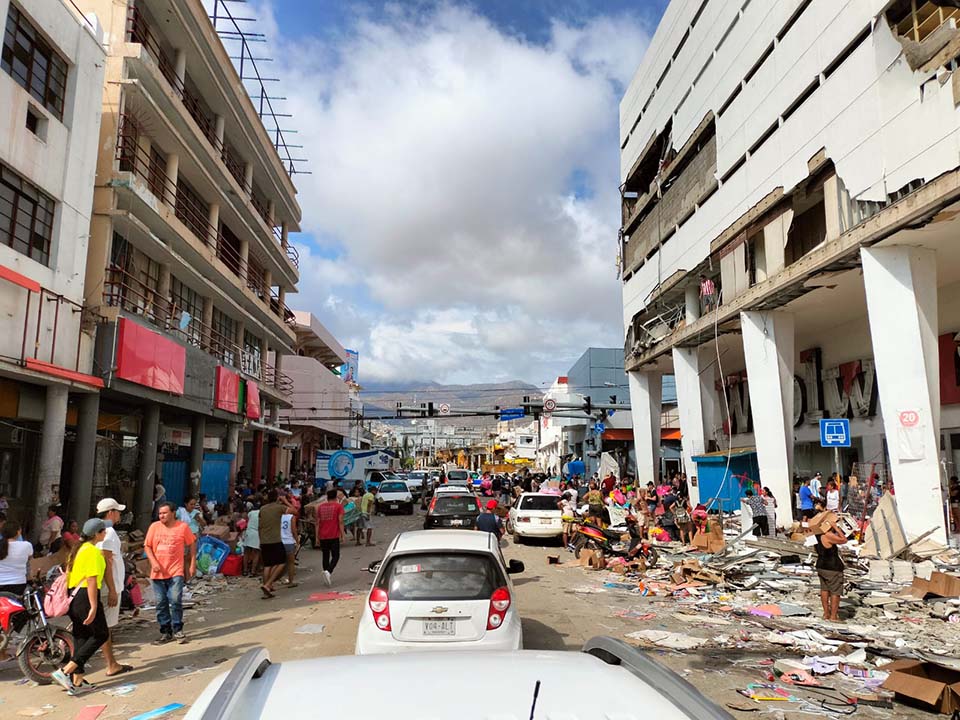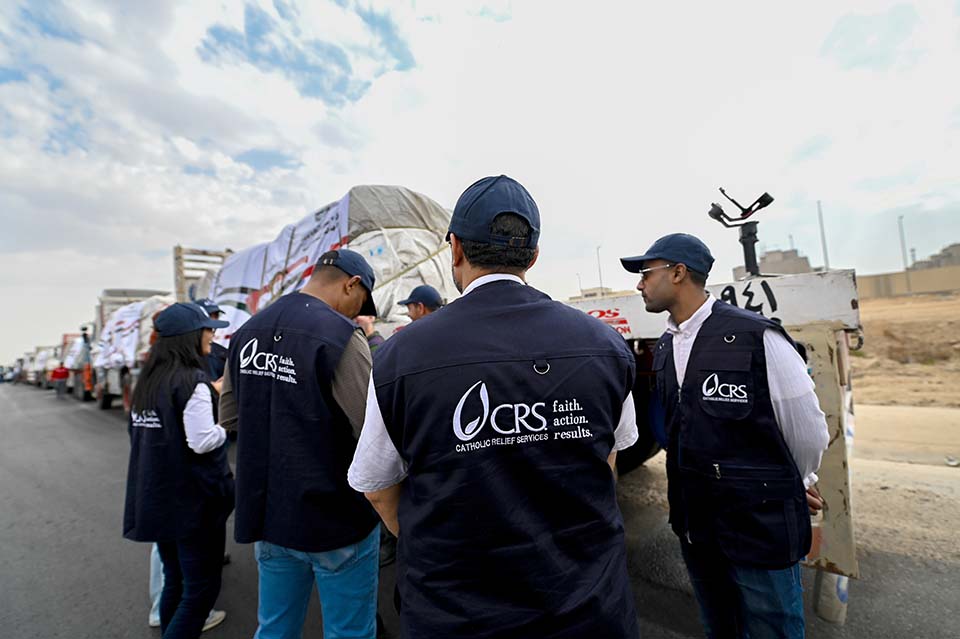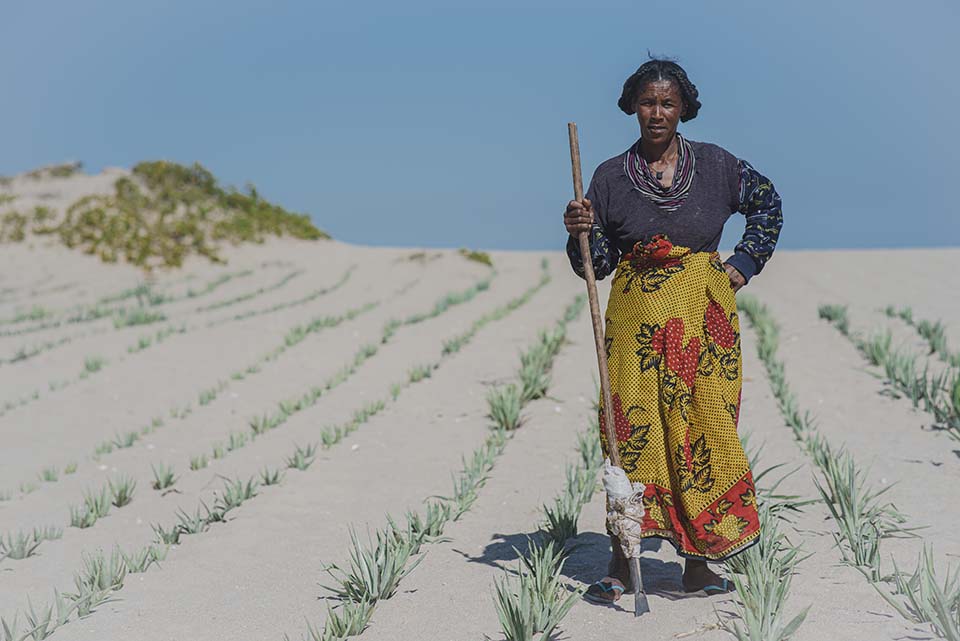Global Food Crisis—CRS has identified 25 priority countries that are affected by high levels of acute food insecurity and malnutrition due to combinations of these drivers, which are expected to continue through 2024. Areas of urgent concern include East Africa and the Sahel, as well as Central America, Southern Africa and, more recently, Gaza.


Global Emergency Update December 2023
Global Emergency Update Ongoing Emergencies and Priorities for 2024
As Catholic Relief Services prepares to welcome a new year, we anticipate the most urgent humanitarian needs and opportunities for global impact in 2024. Our work is possible thanks to the generous support of private and public donors, the dedication of our local partners, and the unwavering presence of Caritas Internationalis and the Catholic Church.
MEXICO
More than six weeks after Hurricane Otis struck Acapulco on Mexico's Pacific coast, response efforts continue. As of November 11, the Mexican government has reported 48 deaths and 30 missing people. In Acapulco de Juárez and Coyuca de Benítez, 551 individuals remain in temporary shelters. The government has initiated a $3.4 million reconstruction plan, involving economic support and the delivery of household items and weekly food baskets. Despite this plan, experts estimate the hurricane's damage at $15 billion, surpassing available public resources.
In collaboration with Caritas Mexicana, CRS is responding to the Hurricane Otis emergency with water, sanitation and hygiene, shelter and food security. Caritas Mexicana's response team, along with CRS advisors, is on the ground evaluating kit distribution sites, addressing protection risks and setting up operation centers for volunteers. They are recruiting volunteers from diocesan structures outside Acapulco for initial project implementation. Caritas Mexicana coordinates with diocesan Caritas offices for efficient distribution of donations, while ongoing efforts include finalizing visits to neighborhoods for technical support in safeguarding and water, sanitation and hygiene initiatives. CRS and our partners have distributed food and hygiene kits to 200 families in two urban communities and will soon be distributing expanded shelter kits—with tarps, mosquito nets and other materials—to 1,000 families.
As the recovery efforts intensify, Caritas Mexicana and CRS are also focusing on long-term resilience through a collaborative project that aims to address immediate needs and support communities in building resilience against future disasters. This includes initiatives for sustainable water access, infrastructure improvements and community-based programs to enhance disaster preparedness and response. By combining immediate relief with a forward-looking approach, the partnership seeks to empower affected communities and contribute to their ability to withstand and recover from the impacts of Hurricane Otis and similar crises in the future.

Devastation caused by Hurricane Otis, a Category 5 storm with 165 mph winds, hit the Pacific coast of Mexico on Wednesday, October 25, 2023.
Photo courtesy of Caritas Mexicana
JERUSALEM, WEST BANK AND GAZA
After a seven-day pause in fighting, between November 24 and 30, hostilities between Israel and Hamas resumed on December 1, including intense attacks in the southern half of Gaza and continued large-scale displacement of civilians. Life-threatening conditions persist in Gaza as families take refuge in overcrowded, under-resourced shelters. There is no safe place for people to take cover—not even hospitals, homes, U.N. shelters or churches. Nearly 1.9 million people—85% of the population—have been displaced, leading to the spread of diseases and challenges in receiving assistance. The north has been largely cut off from food and water and, across Gaza, people have been standing in lines for hours for bread and desalinated water. Winter temperatures are making the conditions all the more challenging as few families were able to flee with any of their winter clothes or blankets.
As civilian deaths increase in Gaza, so does the destruction of civilian, residential, medical and religious properties. Since October 7, it is reported that more than 19,200 people have been killed, of whom more than 7,700 are children. At least 60% of homes in Gaza have been destroyed. It is reported that vulnerable groups are struggling in the difficult shelter conditions—including people with disabilities, women who are pregnant and those who have recently given birth and are breastfeeding. Since October 11, the Gaza Strip has been under an electricity blackout. Beyond people’s physical needs is the emotional toll across the Holy Land—immense suffering, despair, grief and trauma.
CRS’ emergency response is cross-regional and supporting urgent humanitarian needs as well as those anticipated for the long term. Since the onset of the crisis, CRS teams within Gaza have been providing cash assistance for families to purchase food and supplies from local markets. This includes the recent use of donkey carts for transportation, given the lack of fuel and damaged or flooded roads. We have complemented that assistance with the distribution of essential winter and bedding items procured within Egypt and transported across the border. This assistance will expand to include hygiene and shelter supplies. CRS has also been providing support to four Church partners within Gaza as they shelter thousands of people. CRS and our partners are prioritizing psychological first aid, caretaker resources and support and referrals for specialized trauma, grief and other counseling and support.
CRS is carrying out these efforts with 49 Gazan staff members—nearly all of whom are displaced in Gaza, many of whom have experienced loss of or damage to their homes and all of whom are mourning loved ones. We continue to work closely with 13 trained local partners in Gaza, 21 partners across the West Bank, and a cross-regional team to meet the urgent needs in a fluid and rapidly changing context. In Gaza, CRS distributed bedding supplies to 1,032 families and has transferred multipurpose cash assistance to 115,590 people since the start of hostilities. CRS has additional humanitarian supplies at the border with Egypt waiting to enter Gaza, additional items procured and ready to depart Cairo in the coming days, and additional international shipments scheduled to enter Egypt by mid-December. CRS continues to support four church premises in Gaza with cash assistance and local procurement.

In Cairo, CRS teams coordinate the procurement and shipment of emergency supplies for displaced Gazan families.
Photo by Sayed Hassan for CRS
UKRAINE
The war continues to drive increasing humanitarian needs in Ukraine, particularly impacting people who remain in communities close to the front line. Since the Russian invasion of Ukraine in 2022, more than 7 million people have fled to neighboring countries, while 6.3 million remain displaced within Ukraine. Across the region, the role of Caritas partners is unparalleled. Even at the onset of conflict—when Caritas staff members were directly affected and uprooted from their homes and loved ones—they provided food, shelter, counseling and medical assistance.
CRS’ support to Caritas partners in 11 nearby countries has directly benefited 1.6 million people with safe shelter, food and nutrition, cash assistance, hygiene and living supplies, counseling, protection and health services. These efforts have evolved to meet longer-term needs—such as repair to war-damaged homes, cash assistance for rent, language courses and jobs-skills training in neighboring countries, and education and trauma healing for children. A major part of CRS support is assisting Caritas partners with capacity and support for project implementation.
CENTRAL AMERICAN MIGRANT CRISIS
In Honduras, Guatemala and El Salvador, escalating gang violence and drug cartels have caused families to flee north in increasing numbers. Economic collapse in places like Venezuela, as well as failed harvests caused by environmental degradation and climate change, are driving large numbers of people to flee desperate conditions in their home countries. Thousands of people—including entire families—have arrived in Mexico seeking humanitarian visas, shelter, asylum or transit permits to reach the U.S. border. At the same time, Mexicans are displaced and migrating north to escape organized crime.
More than 120 shelters and organizations are managed by Catholic institutions and civil society organizations across the region that provide food, safe shelter, medical assistance, legal advice, counseling and referrals to other organizations as needed for additional services. These shelters have been doubling or even tripling their capacity and providing more services than usual—particularly for mental health, employment, legal representation and education.
CRS is working with our Catholic partners and civic organizations to improve the safety, quality and efficiency of shelters and to strengthen the capacity of staff and institutions at the front lines of the migrant crisis. This includes assistance with food, medicine and supplies; legal, medical and psychological counseling; upgraded facilities; and strengthening the capacity of shelter staff.

CRS staff member, Oriana Zapata, in Tijuana. CRS supports a network of 35 shelters in Mexico that have expanded their capacity to offer humanitarian aid, serving 87,571 migrants.
Photo by Oscar Leiva/Silverlight for CRS
GLOBAL FOOD CRISIS
Over the past year, families and communities in different parts of the world have experienced a total disruption and devastation to their lives with increasing food insecurity. The numbers are unprecedented. At least 258 million people are affected across 58 countries and territories, particularly in East Africa and the Sahel region. In some cases—like Somalia—people are enduring severe hunger and malnutrition in famine-like conditions, as a drought has destroyed their crops and uprooted families in search of food and water wherever they can find it. In other areas, like the Sahel, heightened conflict has displaced communities and restricted access to their land and markets, depriving them of nutrition, food and any means to earn an income to provide for their families.
While the impacts differ by location, CRS is responding with collective urgency worldwide, tailoring responses with local partners to support families and communities in each location. These include efforts to meet essential needs with food distributions, nutritional supplements, clean water and health care. Additionally, CRS and our partners are also seeking to address the root causes of food insecurity by investing in sustainable agricultural practices.
To reverse the alarming trend, it is crucial to collaborate with and support existing local systems. CRS is supporting and working with local organizations—who are often the first responders to emergencies—as well as local governments, which play a vital role in social protection. Also, our efforts promote the recovery and strengthening of local market systems, to ensure affordable food and support of local livelihoods. By engaging local vendors, suppliers and markets, we can contribute to the survival and recovery of the local economy, and help communities overcome these types of emergencies that have become life-threatening.

Pelamasy Avilina, a mother of 11 children, received food assistance through a project that also helped to stabilize sand dunes in Madagascar. “Without these supplies, my child would be at risk of malnutrition,” she says.
Photo by To Fy Rabenandrasana/CRS
NORTHERN ETHIOPIA
Northern Ethiopia is grappling with a dire humanitarian crisis due to two years of armed conflict. The clashes between Ethiopian federal forces and regional security forces in Tigray have led to widespread destruction of critical infrastructure and displaced millions of people. Compounding the issue, the country is facing one of its most severe droughts in 40 years, with an estimated 23.5 million people in urgent need of humanitarian assistance. Public institutions like schools and health facilities have been damaged, disrupting essential services, particularly in education where over 2,000 schools have been affected, leading to increased dropouts and closures, affecting nearly 1.5 million children.
To address the crisis, CRS is actively responding by providing critical food and support to 7.7 million people across Ethiopia, with a focus on conflict-affected areas. The response includes emergency relief, food assistance, shelter, water access, and health services. CRS is also collaborating with local partners to restore education access by repairing damaged schools, providing supplies and offering training for teachers on trauma healing. Additionally, efforts are underway to support the restoration of community assets, promote agricultural and alternative livelihoods, and ensure social cohesion and peacebuilding. Key priorities include meeting basic human needs, repairing schools, restoring access to healthy environments and essential infrastructure, and improving overall well-being and social cohesion within conflict-affected communities.
AFGHANISTAN
A series of three large earthquakes in October 2023, as well as several weeks of frequent aftershocks, have resulted in tremendous loss among more than 300 communities in western Afghanistan. In addition to experiencing the traumatic loss of or injury to family members and friends—with 1,480 casualties and 1,950 injured because of the earthquakes—families also experienced significant damage to their homes and public infrastructure, like water supply facilities, sanitation points and schools. With these earthquakes striking right before winter and at the beginning of the lean season, many of these families are now in a critical situation with few resources and capital to build back and recover.
More than 48,000 families have been affected, and approximately 10,000 homes have been completely destroyed, with another 20,430 severely damaged.
Displacement sites formed in Herat just after the disaster. The most pressing needs are for food, hygiene and sanitation, access to water, and shelter. In collaboration with UNICEF, CRS is actively responding in Herat by providing swift cash assistance and supporting shelter, water, sanitation and hygiene initiatives.
Simultaneously, Afghanistan is grappling with another crisis as the Pakistan government announced the deportation of foreigners without documentation, including an estimated 1.7 million undocumented Afghan migrants. Around 356,000 Afghans have returned to Afghanistan in recent weeks, straining the country's already overloaded system. Approximately 770,000 people at border points will require assistance, including immediate needs such as food, water, shelter, education, medical supplies and services, along with longer-term resettlement support. With winter approaching rapidly, addressing these pressing needs is critically urgent.
BANGLADESH
Bangladesh became home to the world's largest refugee settlement in 2017, hosting 900,000 Rohingya refugees who fled discrimination and repression in Myanmar's Rakhine State. In a short span, a hillside forest turned into an informal settlement. The toll extends beyond physical displacement, as the social fabric sustaining Rohingya families was abruptly torn, leading to violent attacks. CRS and Caritas Bangladesh, in collaboration with the government and various partners, have provided vital relief, evolving from immediate needs to long-term support, focusing on protecting families, ensuring dignity, healing trauma and preparing for potential return to Myanmar.
Efforts span building safe living conditions, including upgrading family shelters and supporting communities to be prepared for disasters. Safe spaces for women, girls and children have helped to provide counseling, informal education and life skills training. We are also supporting options for durable and dignified livelihoods—not only for Rohingya but also for local Bangladeshi communities—that can help provide a boost in income, while supporting local infrastructure repair and even strengthened community relations.
Even in this years-long displacement, CRS is focused on ensuring dignified living environments and building resilience for a sustainable return to Myanmar when conditions allow.
YEMEN
In Yemen, CRS and our partners have been supporting families and communities with tremendous impact despite especially challenging conditions. Since 2014, Yemen has faced armed conflict that has led to displacement, disrupted public services and economic collapse. Approximately 21 million Yemenis, or two-thirds of the population, need humanitarian assistance to sustain their lives—and, in some cases, to survive. Half of Yemen's health facilities lack staff, medicine and equipment, hindering their ability to meet community needs. Unemployment, especially among young people, remains high, impacting critical sectors like health. CRS and our local partners have been responding to meet the needs of emergency health care, as well as investing in efforts to address youth employment as a way to cover the staffing gap in medical facilities, and to improve care quality.
With Caritas Poland, CRS is supporting primary health facilities, delivering critical services to vulnerable communities affected by conflict. Since 2020, efforts have focused on reopening and sustaining health facilities damaged by the conflict, providing essential health services, including disease prevention, emergency obstetric care, immunizations and malnutrition management. Facing a funding gap in 2022, three at-risk health facilities were saved from closure through emergency support, benefiting 41,376 people. Ongoing activities include operational management, procurement of supplies, deployment of community midwives, and ensuring water, sanitation and hygiene standards.
CRS is addressing Yemen's shortage of qualified medical professionals and high youth unemployment by providing job training and placement programs.
Recent Global Emergency Updates
February 2024
Ukraine War: Two Years of Emergency Relief and Recovery—In February of 2022, Russia invaded Ukraine, causing massive destruction and loss, separating families and uprooting millions of people from their homes. Over the past two years, Catholic Relief Services has worked with Caritas and other partners across Ukraine and the region to provide a range of support to meet people’s urgent needs for food, shelter, living supplies, medical care and counseling.
January 2024
Emergency Response in the Holy Land—Catholic Relief Services and our partners are responding to immediate needs of families facing hunger and displacement in the Holy Land.

